The Council of the European Union has recently announced the digitalisation of the Schengen visa application process. This significant move will enable UAE residents, among others, to apply for their Schengen visas entirely online, marking a departure from the traditional method that included physical visa stickers and mandatory consulate visits.
Spain’s Interior Minister, Fernando Grande-Marlaska, remarked that this new online system, introduced under Spain’s presidency of the Council, aims to simplify the application process for travelers while also reducing the administrative load on national authorities. The system is expected to offer a faster and more efficient response.
The changes are particularly relevant to countries that do not have a visa-free regime with the EU. The new online process involves three major updates:
Complete Online Application: Applicants can now submit all necessary information, documents, and payments through the new EU visa application platform.
Reduced Consulate Visits: In-person visits to consulates or visa service providers will be limited to first-time applicants, individuals needing biometric data updates, and those with new travel documents.
Digital Visa Format: The traditional visa sticker on passports will be replaced with a digitally issued visa, featuring a cryptographically signed 2D barcode, enhancing security against counterfeiting and theft.
The implementation date for these changes will be determined following the completion of the technical aspects of the visa platform and digital visa. The regulations will become effective 20 days after publication in the Official Journal of the European Union.
Schengen visas are issued by 22 EU countries, including Austria, France, Germany, and Spain, as well as four non-EU countries: Iceland, Liechtenstein, Norway, and Switzerland. Notably, EU members Bulgaria, Cyprus, Ireland, and Romania do not issue Schengen visas.






